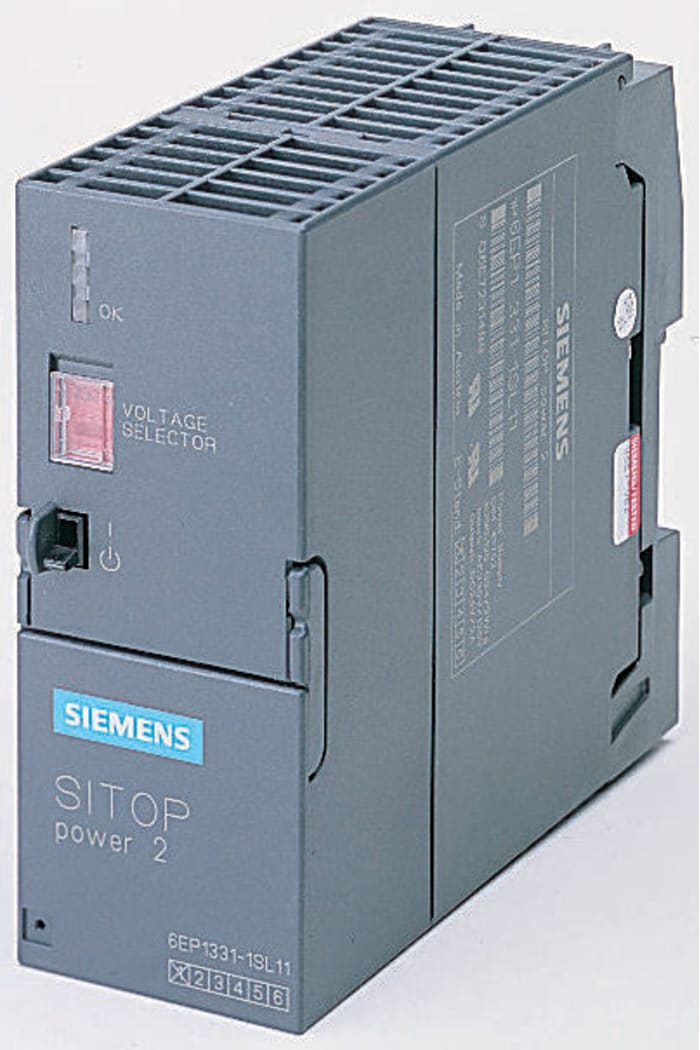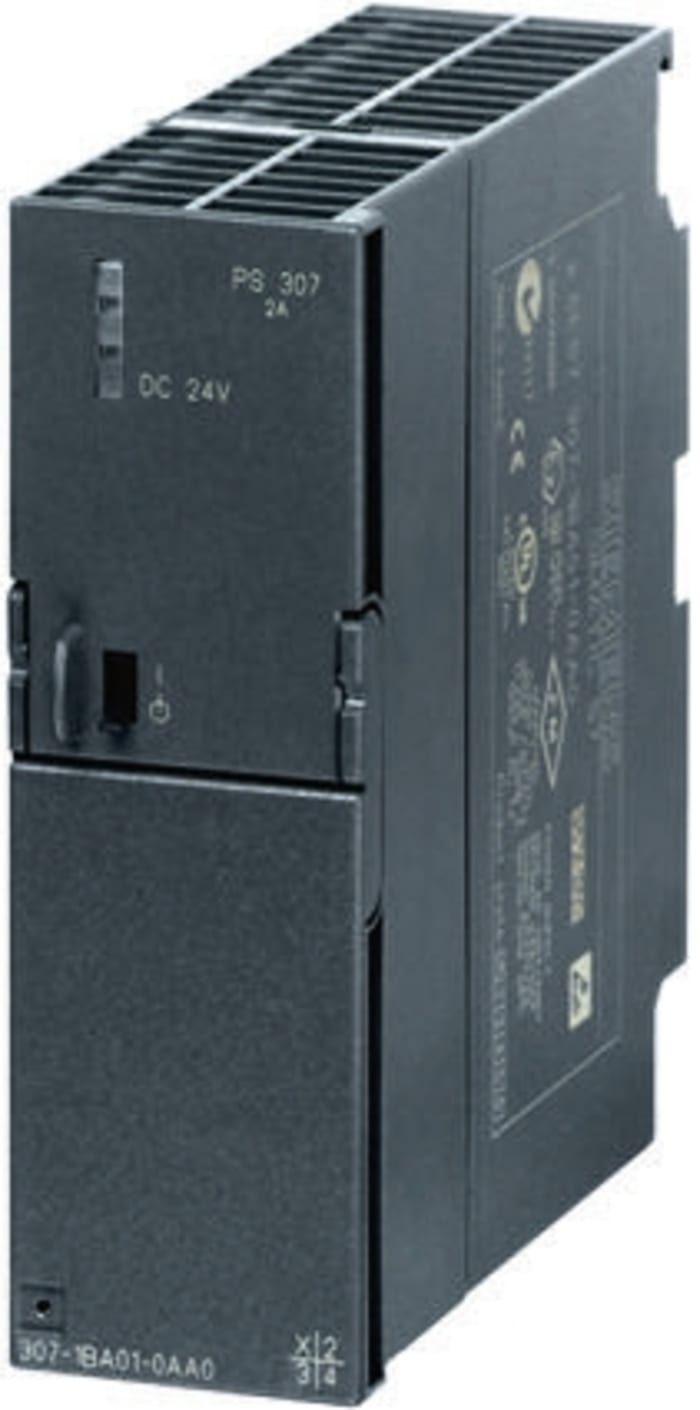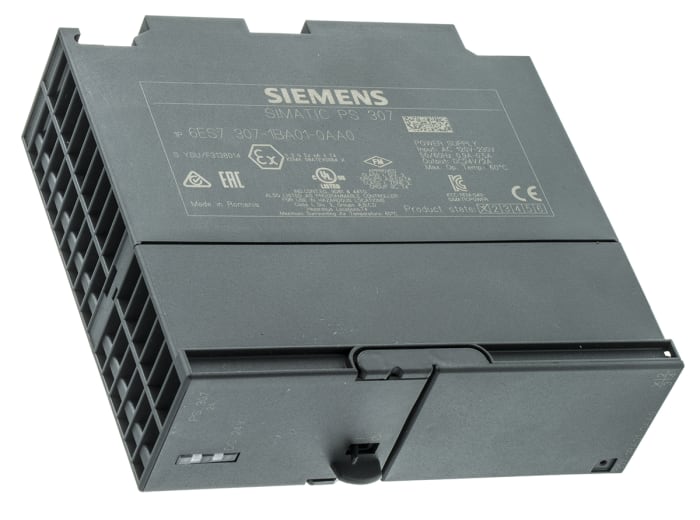Technical Document
Specifications
Brand
SiemensSeries
SIMATIC S7-300
Type
Switched Mode
Electrical Phase
1
AC or DC Input Voltage
ac
Number of Outputs
1
Input Voltage
120 → 230V ac
AC or DC Output Voltage
dc
Output Voltage
24V dc
Output Current
5A
Power Rating
120W
Dimensions
120 x 60 x 125mm
Depth
125mm
Width
60mm
Height
125mm
Minimum Temperature
0°C
Ripple And Noise
50 mV PK-PK
Load Regulation
0.5%
Maximum Temperature
+60°C
Mounting Type
DIN Rail Mount
Country of Origin
Romania
Product details
S7-300 Power Supply
The SIMATIC PS307 single-phase load power supply (system and load power supply) with automatic input voltage range selection is optimally adapted to the SIMATIC S7-300 controller in its design and functionality. The power connector, which is included in the scope of delivery of the system and load power supply, enables quick supply of the CPU. The 24 V supply of other S7-300 system components, input/output circuits of the I/O modules and, if applicable, sensors and actuators is also possible. Extensive certifications such as UL, ATEX and GL enable universal use. Regardless of the industry or requirements, Siemens offers reliable and efficient power supplies for every plant.
Features and Benefits
- The system and load current supplies are screwed directly onto the S7-300 standard mounting rail and can be mounted directly to the left of the CPU
- Diagnostic LED for indicating “Output voltage 24 V dc O.K."
- ON/OFF switches for possible swapping of modules
- Strain-relief assembly for input voltage connection cable
- Short-term power failure backup
- Output voltage 24 V DC, stabilized, short circuit-proof, open circuit-proof
- Parallel connection of two power supplies for enhanced performance
Product Application Information
Comprehensive certifications, such as UL, ATEX and GL enable universal use in various industries.
Why use a DIN Rail power supply?
The flexibility of DIN Rail mounting systems enables quicker installation time as all devices are able to simply snap onto the metal rails. Power supplies can be easily organised on DIN Rails within enclosed wall boxes or in areas where there is limited space. Similar devices can be mounted next to each other reducing the amount of cabling required. Most power supplies are convection cooled so no cooling fans are needed.
DIN Rail AC to DC power supplies are widely used in many automation, instrumentation and industrial applications. They are used to power a wide variety of DC operated devices including sensors, motors, actuators, solenoids, relays and many more.
Points to consider when buying a DIN Rail power supply
DIN Rail size – There are three common types of DIN Rails. Top Hat, G section and C section. Most have a depth of 7.5 mm or 15 mm. It is wise to check that your power supply is compatible with your DIN Rail.
Protection types – It is important to choose a power supply that is protected against either short circuit, overload, over temperature or over voltage. Some power supplies also offer a hiccup mode which will allow the PSU to resume operation once the fault is cleared.
Fixed or adjustable output voltage or current – In test systems it is often convenient to have adjustable DC voltage however in other applications a fixed DC supply may be essential.
Cabling and wiring – The input/output lines to and from the power supply should be as short as possible with a large cross sectional area to help minimise noise and heat.
Efficiency – Choose a power supply that has a high efficiency to minimise the amount of power dissipation, especially if the system relies on convection cooling.
Input voltage range – If the DIN Rail power supply you are buying is to be used in Europe and North America as well as the UK then a universal AC input range of 80 V ac to 264 V ac is required.
Approvals
CE, cULus, ATEX, cULas Class I Div 2, GL, ABS, DNV
Notes
Each CPU requires a Micro Memory Card (MMC). Programming may be carried out using the Step 7 Lite software (stock no. 539-1755).
Stock information temporarily unavailable.
Please check again later.
P.O.A.
1
RS Components & Controls (I) Ltd
Distribution hub - B-89, Sector 67, Noida, Gautam Budh Nagar, (Uttar Pradesh), 201 301
P.O.A.
1
Technical Document
Specifications
Brand
SiemensSeries
SIMATIC S7-300
Type
Switched Mode
Electrical Phase
1
AC or DC Input Voltage
ac
Number of Outputs
1
Input Voltage
120 → 230V ac
AC or DC Output Voltage
dc
Output Voltage
24V dc
Output Current
5A
Power Rating
120W
Dimensions
120 x 60 x 125mm
Depth
125mm
Width
60mm
Height
125mm
Minimum Temperature
0°C
Ripple And Noise
50 mV PK-PK
Load Regulation
0.5%
Maximum Temperature
+60°C
Mounting Type
DIN Rail Mount
Country of Origin
Romania
Product details
S7-300 Power Supply
The SIMATIC PS307 single-phase load power supply (system and load power supply) with automatic input voltage range selection is optimally adapted to the SIMATIC S7-300 controller in its design and functionality. The power connector, which is included in the scope of delivery of the system and load power supply, enables quick supply of the CPU. The 24 V supply of other S7-300 system components, input/output circuits of the I/O modules and, if applicable, sensors and actuators is also possible. Extensive certifications such as UL, ATEX and GL enable universal use. Regardless of the industry or requirements, Siemens offers reliable and efficient power supplies for every plant.
Features and Benefits
- The system and load current supplies are screwed directly onto the S7-300 standard mounting rail and can be mounted directly to the left of the CPU
- Diagnostic LED for indicating “Output voltage 24 V dc O.K."
- ON/OFF switches for possible swapping of modules
- Strain-relief assembly for input voltage connection cable
- Short-term power failure backup
- Output voltage 24 V DC, stabilized, short circuit-proof, open circuit-proof
- Parallel connection of two power supplies for enhanced performance
Product Application Information
Comprehensive certifications, such as UL, ATEX and GL enable universal use in various industries.
Why use a DIN Rail power supply?
The flexibility of DIN Rail mounting systems enables quicker installation time as all devices are able to simply snap onto the metal rails. Power supplies can be easily organised on DIN Rails within enclosed wall boxes or in areas where there is limited space. Similar devices can be mounted next to each other reducing the amount of cabling required. Most power supplies are convection cooled so no cooling fans are needed.
DIN Rail AC to DC power supplies are widely used in many automation, instrumentation and industrial applications. They are used to power a wide variety of DC operated devices including sensors, motors, actuators, solenoids, relays and many more.
Points to consider when buying a DIN Rail power supply
DIN Rail size – There are three common types of DIN Rails. Top Hat, G section and C section. Most have a depth of 7.5 mm or 15 mm. It is wise to check that your power supply is compatible with your DIN Rail.
Protection types – It is important to choose a power supply that is protected against either short circuit, overload, over temperature or over voltage. Some power supplies also offer a hiccup mode which will allow the PSU to resume operation once the fault is cleared.
Fixed or adjustable output voltage or current – In test systems it is often convenient to have adjustable DC voltage however in other applications a fixed DC supply may be essential.
Cabling and wiring – The input/output lines to and from the power supply should be as short as possible with a large cross sectional area to help minimise noise and heat.
Efficiency – Choose a power supply that has a high efficiency to minimise the amount of power dissipation, especially if the system relies on convection cooling.
Input voltage range – If the DIN Rail power supply you are buying is to be used in Europe and North America as well as the UK then a universal AC input range of 80 V ac to 264 V ac is required.
Approvals
CE, cULus, ATEX, cULas Class I Div 2, GL, ABS, DNV
Notes
Each CPU requires a Micro Memory Card (MMC). Programming may be carried out using the Step 7 Lite software (stock no. 539-1755).




